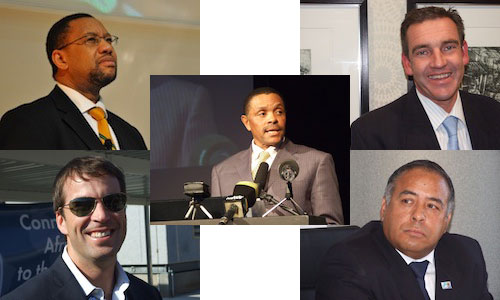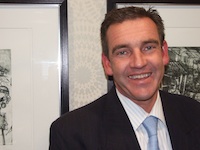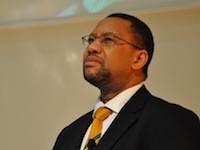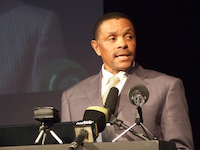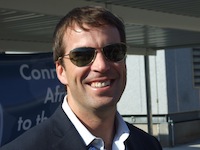This is the second and final part of TechCentral’s inaugural technology “Newsmakers of the Year” awards. These are the people who made the headlines in 2009. And, for the most part, they are also happen to be the people who made a real difference in the technology year that was.
Who is our top Newsmaker of the Year for 2009? Read on to find out. And please be sure to check out part one.
The Telkom CEO pushed for and then oversaw the sale and unbundling of the group’s 50% stake in Vodacom. It was a brave move to sell one of its crown jewels, but — whether by design or through blind luck — Telkom secured top dollar from the UK’s Vodafone, which paid it R22,5bn for 15% of Vodacom. Though there was obviously a premium in the price, Vodafone effectively placed a value on Vodacom of R150bn. Today, however, Vodacom, which listed on the JSE following the transaction, has a market value of just R80bn, or little more than half of the value placed on it when Vodafone first made its offer to Telkom in 2008. Telkom has distributed about half the proceeds from the sale to its shareholders and retained the rest. Ironically, some of the money will be used by Telkom to build a third-generation mobile network. With regulatory and competitive pressures mounting, the future looks uncertain for Telkom. Analysts regularly criticise September, saying he’s not the right man to lead group. Certainly, recent financial results suggest a company that could lose its way soon if it’s not careful. September has 2010 to prove his critics wrong.
If TechCentral had launched this list in 2008, the Altech CEO would have been our clear choice for Newsmaker of the Year. Altech’s decision to challenge former communications minister, the late Ivy Matsepe-Casaburri, in court, resulted in the liberalisation of SA’s telecommunications industry. But regulatory frustrations and the competitive dynamics of the SA market have meant that Altech hasn’t built its own national network here. Instead, it’s focused much of its energy in telecoms on East Africa, where it is rolling out thousands of kilometres of fibre-optic cables, creating a network that spans Kenya, Tanzania, Rwanda, Uganda and the Democratic Republic of Congo. Venter says Altech will pump at least US$20m/year over the next several years in new infrastructure in East Africa. The JSE-listed group, which is the principal shareholder in Kenya Data Networks, has also acquired 5Gbit/s in the Seacom undersea cable system and is an investor in the Kenyan government-led Teams cable. Venter has shown that for brave investors, there’s plenty of money to be made elsewhere on the continent. It’s just a pity Altech is not investing in telecoms infrastructure at home.
The MTN president and CEO did an extraordinary amount of work in 2009 trying to pull off a deal with India’s largest mobile operator, Bharti Airtel. But the talks came to naught, despite months of due diligence. The proposed deal broke down, it is said, because the SA government’s insisted on a dual-listed structure. Indian law does not allow for dual listings. The deal, if it had happened, would have created the world’s third-largest mobile operator by subscriber numbers. The question now is what Nhleko will do next. He’s indicated previously that there’s a good chance he won’t stay on at MTN when his contract ends in June 2010. Will he look to do one more blockbuster deal before he goes? Or will the collapse of the Bharti talks encourage him to stay on for a while longer? There are two possibilities. Either he’ll fade quietly from the scene next year, making way for fresh blood at MTN, or he’ll be all over the financial pages of the newspapers again.
The new communications minister, a former military general, has set about fixing many of the problems left by his predecessor. Many executives in SA’s telecoms industry speak highly, both publicly and privately, of his first six months in office. It’s still early days, but Nyanda appears to have the energy and the nous to get the sector, which had been crippled for years by policy indecision, moving again. Like the new director-general, Mamodupi Mohlala, the minister wants the markets to drive down telecoms prices. However, he must still spell out what his plans are for state-owned Sentech, which is sitting on vast tracts of valuable radio frequency spectrum. This is spectrum that could be put to better use in private hands. Though Nyanda has also attracted his fair share of controversy — not least for his decision to buy two luxury BMWs at taxpayers’ expense — he is off to a promising start. Having the mobile operators agree to a voluntary cut in interconnection rates and cleaning up the SABC board were both significant achievements. Nyanda appears determined to do something about SA’s high telecoms prices, with broadband policy on the agenda for early next year. Let’s hope he keeps up the momentum in 2010.
We think the Seacom president is the obvious choice for Newsmaker of the Year. The $600m undersea cable project has brought international fibre connectivity to countries in East Africa for the first time and finally broken Telkom’s stranglehold over international bandwidth in SA. The Seacom project was highly complex — aside from the technical aspects thereof, Herlihy and his team had to deal with the complexities of regulation and legislation across a range of African territories. And then there were the pirates off Somalia, who literally gave Herlihy bad dreams. At one stage, Seacom board meetings even featured a regular agenda item called “pirates”. Despite the challenges, Herlihy pulled off the project on budget and more or less on time. Its importance to the African continent cannot be underestimated. It has already resulted in dramatic price reductions and new investments in terrestrial infrastructure in East Africa. Herlihy is deservedly our Newsmaker of the Year for 2009.
Have we left anyone out who deserves to be on the 2009 newsmakers list? Use the comment box below to provide your views.


